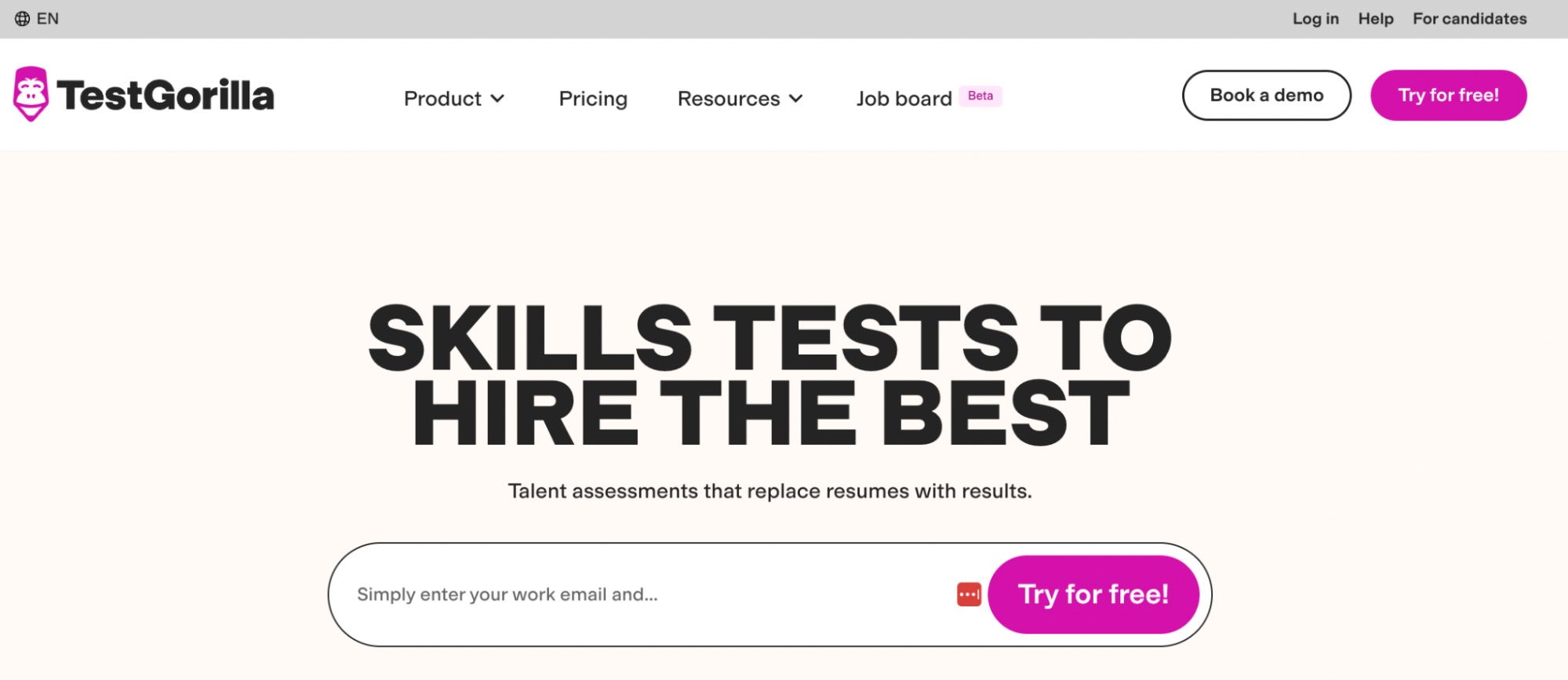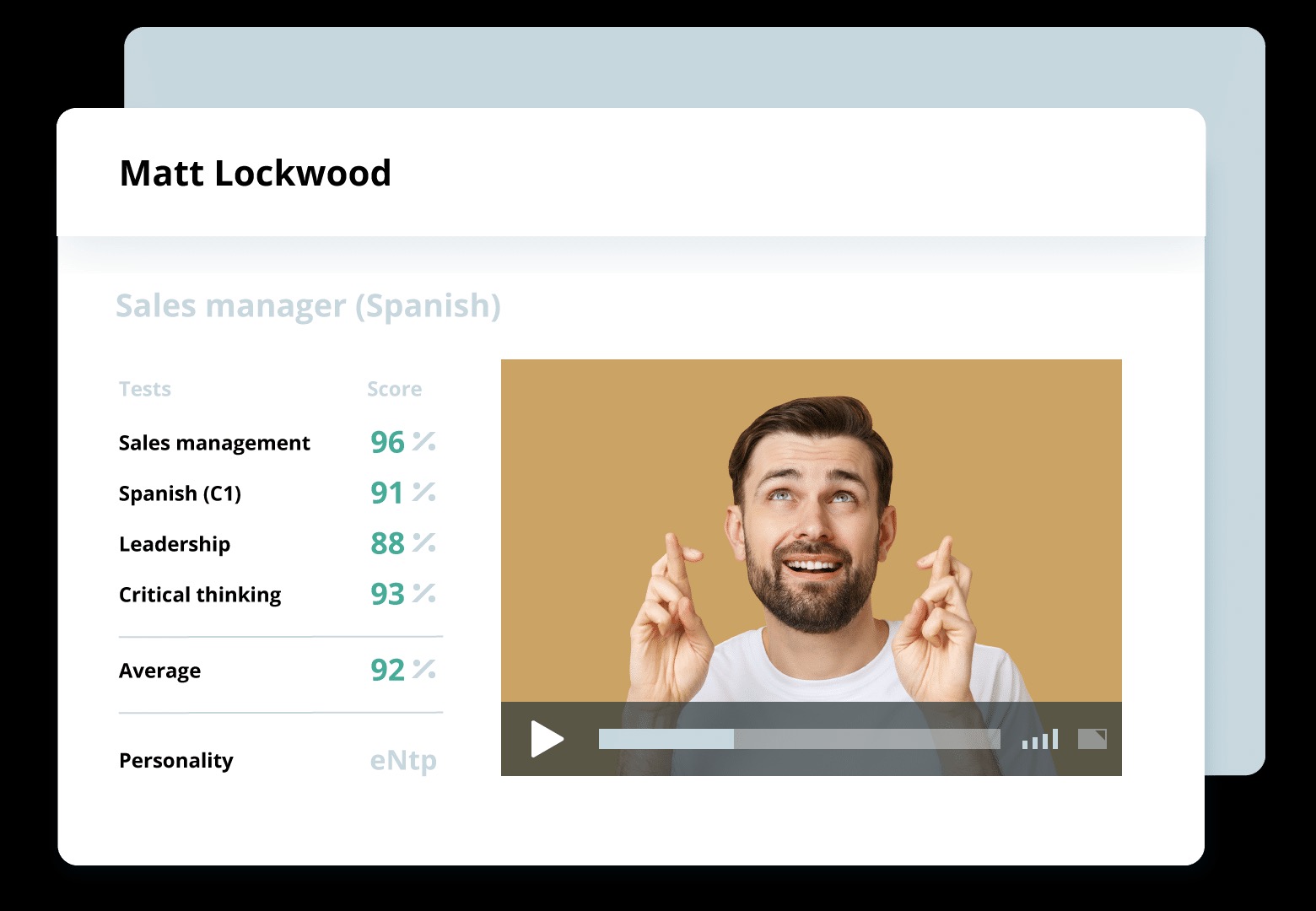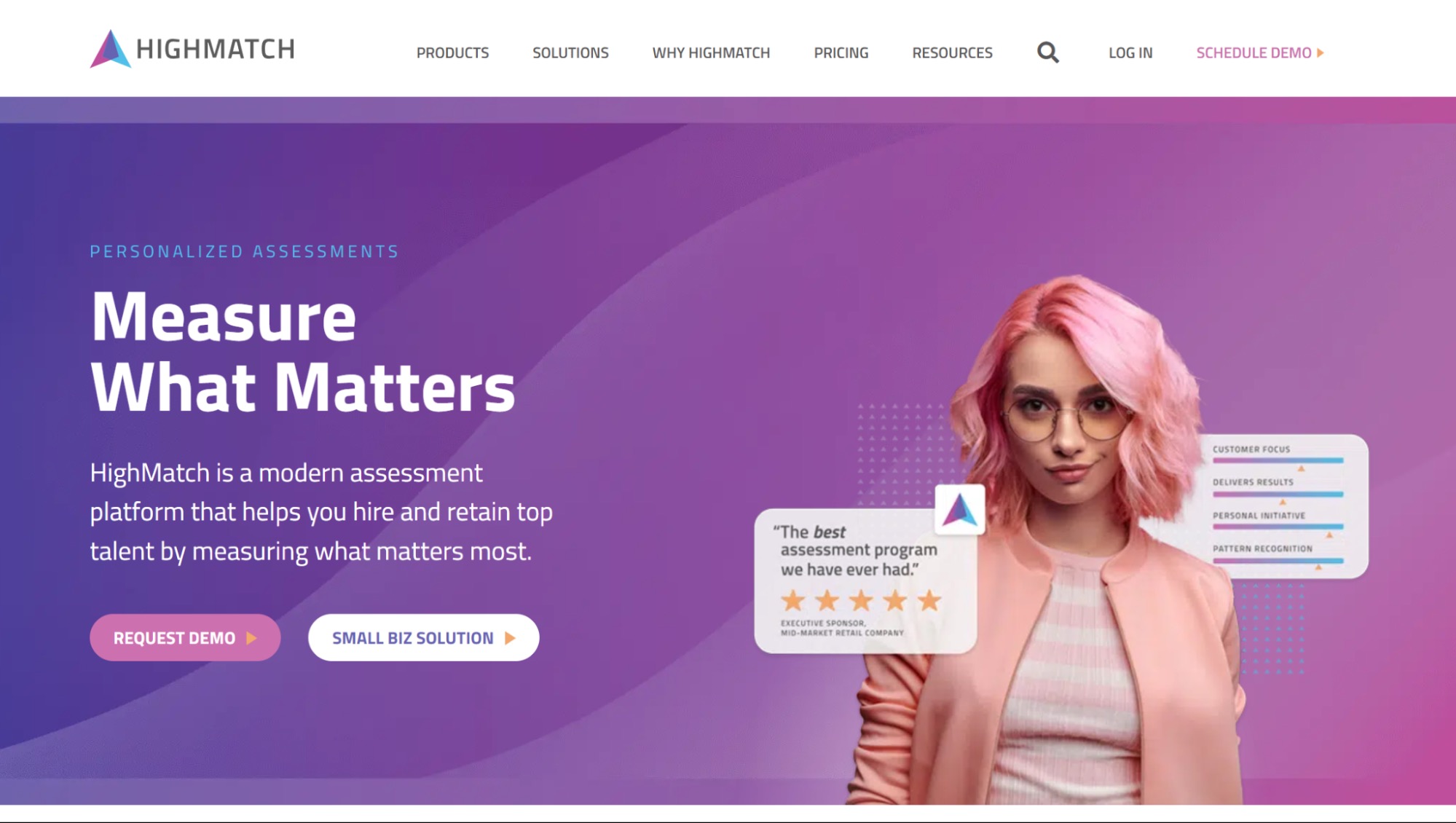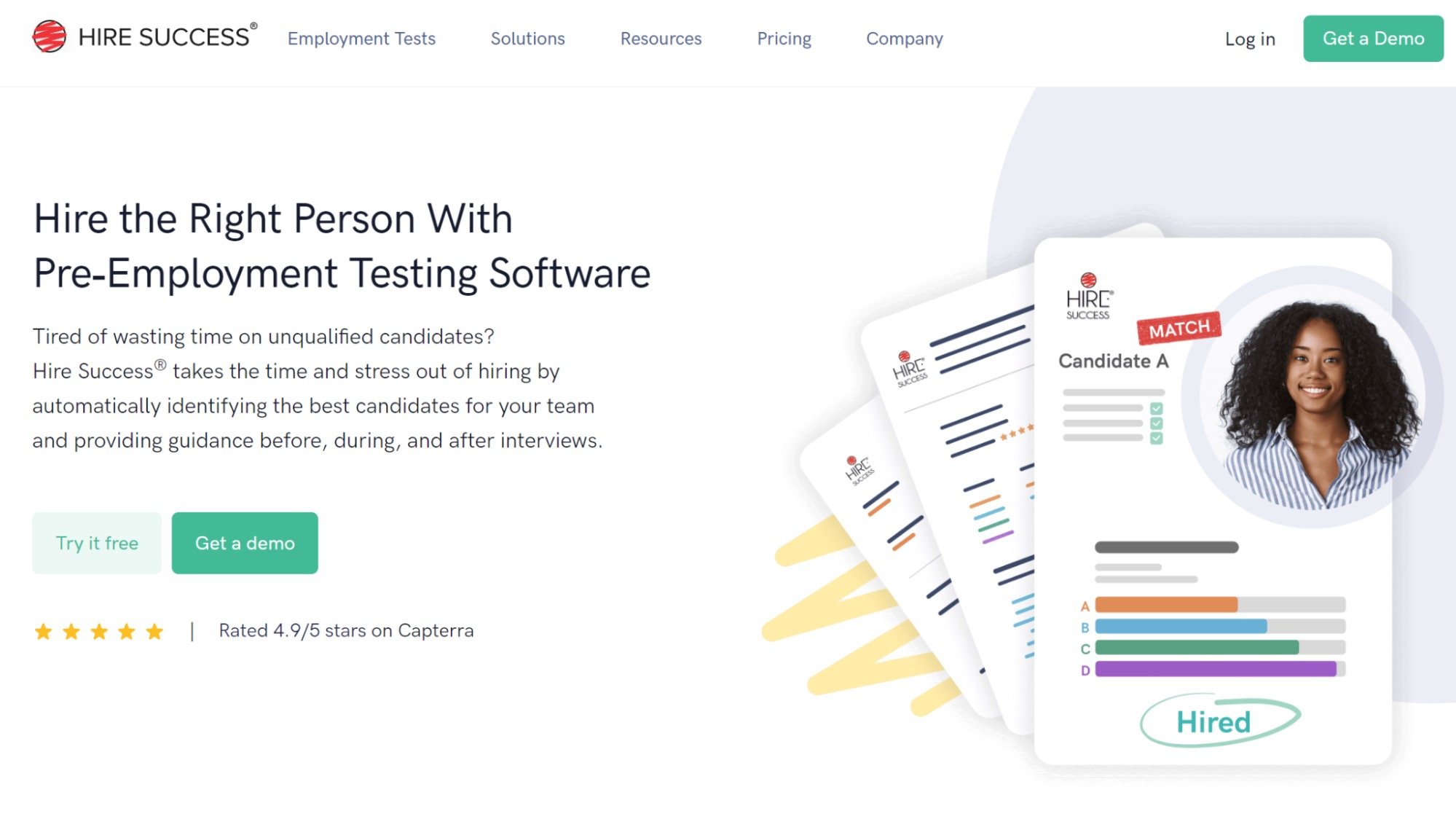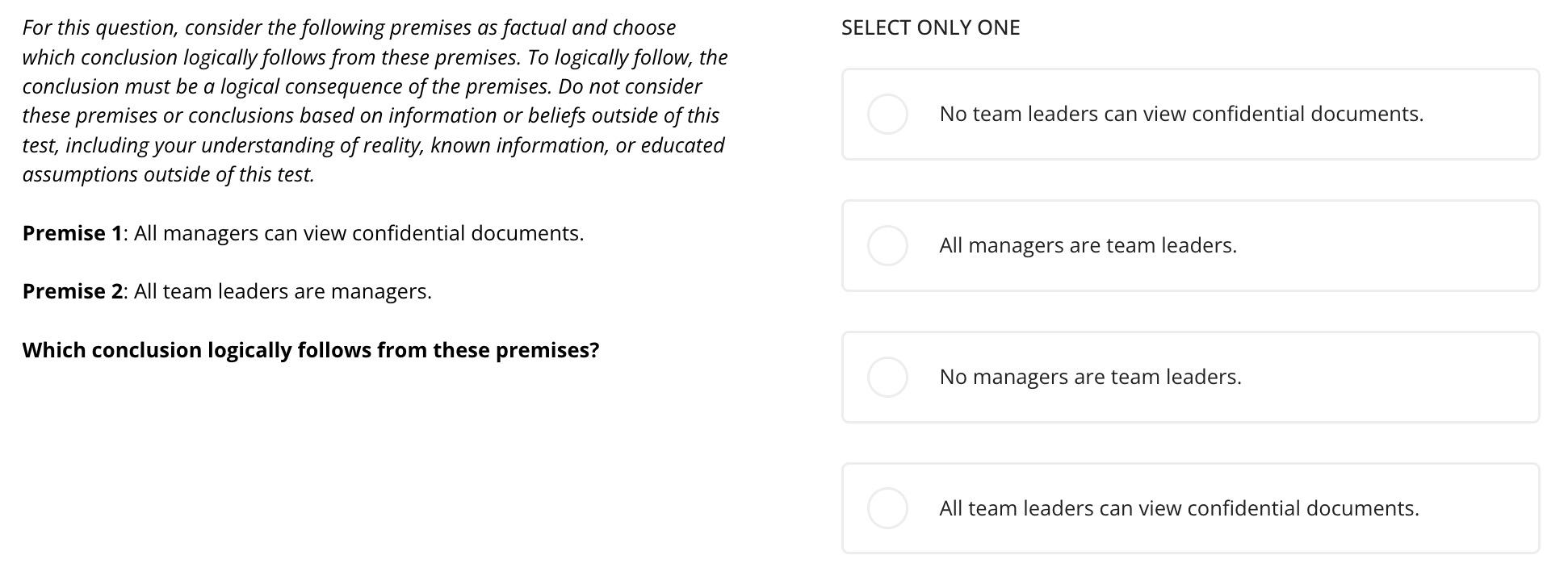Deloitte predicts that soft skill-first jobs will make up 63% of all jobs by 2030. Having the right blend of necessary soft skills keeps your company competitive. For instance, if your leaders can’t communicate effectively, how can your team implement new strategies?
Hard skills are easy to identify; you use skills tests to measure proficiency or look for qualifications. What about soft skills? Resumes and cover letters won’t help, but luckily you can turn to skills tests to also measure power traits, like people management.
In this piece, we examine why these skills matter so much, how to measure soft skills, and the best soft skill assessment tools on the market.
Table of contents
- Why are soft skills so important?
- 7 examples of soft skills you should assess
- What’s the best way to conduct a soft skills assessment?
- Top 4 soft skills assessment tools
- How to measure soft skills effectively in your hiring process
- Level up your hiring process with soft skills assessments
- Soft skills assessment FAQs
Why are soft skills so important?
Soft skills are highly transferable and play an important role in the collaboration and direction of your team. Interpersonal skills like leadership, communication, and project management skills are vital for achieving business goals. Soft skills are more appropriately known as power skills, as they radiate to other team members and can have a positive impact on everyone’s job performance.
One such power skill is emotional intelligence. A Yale study found that emotionally intelligent managers were happier, more creative, and better able to innovate in work environments.
Soft skills are a premium for businesses moving into the digital age. After all, remote employees need communication and time management skills to collaborate effectively and meet deadlines.
Other underrated soft skills benefits include increased profits and productivity.
Soft skills differ from hard skills in that they are difficult to measure and teach. Many people skills like time management and teamwork are often thought of as “innate,” but with the right approach, you can quickly and objectively assess these skills in job candidates.
7 examples of soft skills you should assess
You should be measuring and assessing soft skills in the following seven key categories:
Soft skills | In brief |
Communication skills
| Communication is critical to business continuity. Soft skills include verbal and written communication, active listening, and nonverbal communication. |
Collaboration and teamwork
| Your team members know how to work together as a cohesive unit. Teamwork is also how you foster a collaborative, friendly company culture. |
Problem-solving | Fast-paced environments require team members who can think on their feet. Problem solvers are also more creative and more likely to bring useful ideas to the table. |
Emotional intelligence | A key soft skill in any role, but especially vital for good leaders. You need people who can manage their own emotions as well as recognize the emotions of others. |
Resilience | We all encounter setbacks in our work. Resilient team members maintain their duties at a high level regardless of adversity or pressure. |
Adaptability | Flexibility is crucial for an agile organization. Adaptable talent is open to change and willing to adjust to new processes and environments. |
Leadership and management skills | Every new hire is a potential leader. Assessing leadership qualities boosts your workforce planning strategy. |
What’s the best way to conduct a soft skills assessment?
There are many differences between hard skills and soft skills hiring, including the tools used for measuring and assessing power skills.
Let’s examine three approaches in how to measure soft skills.
Roleplays and trial runs: Observe recruits performing in relevant scenarios. Use one-on-one situations to determine decision-making and problem-solving skills. Team-based simulations identify collaboration, communication, and leadership abilities.
Open interview questions: Open-ended questions provide insight into a candidate's soft skills. For example, “Can you describe a time at work where you had a setback and how you overcame it?”
Soft skills tests: Online soft skills assessment software like TestGorilla provides you with customizable soft skills assessment tests. Head to our test library and find out what’s available for your needs.
Of these three options, skills testing gives you the most objective way to measure these skills. Along with removing unconscious bias, their accessibility also promotes greater diversity and inclusion.
Top 4 soft skills assessment tools
The following four tools are among the best on the web for assessing soft skills.
Software | Benefits |
TestGorilla | - Combine up to five tests to assess multiple soft skills in one exam - Features multilingual support with tests available in 12 languages - Gain access to over 400 online assessments for soft and hard skills - Integrate with over 15 different ATS platforms for greater flexibility |
HighMatch | - A platform built for large hiring pushes - Create custom scoring and benchmarks for every test - Incorporate job previews into assessments - Situational judgment tests available |
iMocha | - Use live video for interviews or test proctoring - AI-powered cheating prevention measures for hard skills like coding - Built-in skills intelligence for skill-gap analysis of your current team - UI is designed for better diversity and inclusion |
HireSuccess | - Comes with a built-in ATS for organizing your hiring pipeline - Enables you to build branded job boards - Easy to view and share candidate reports from anywhere |
Let’s explore the four best soft skill assessment platforms in more detail.
1. TestGorilla: Best for testing multiple soft skills in one assessment
TestGorilla is a comprehensive pre-employment testing platform that helps you evaluate applicants thanks to 400+ tests, including communication, management, and critical thinking assessments.
Our platform makes it easy to build custom assessment packages that identify the most critical skills for each open role. By wrapping these tests all together, you get a holistic view of a candidate, which brings massive benefits to your recruitment process.
For example, soft skill assessments for a copy editor might include reading comprehension, attention to detail, and communication.
That last skill is critical for many roles because 54% of respondents reported better relationships with colleagues due to effective written communication skills. Confident communicators were also found to be more proactive and engaged at work.
In addition, TestGorilla lets you add custom questions and one-way video interviews. You can use these to ask open-ended questions enabling candidates to demonstrate their soft skill sets. For instance, in a leadership position, you might want to see their conflict resolution skills in action by asking how the candidate handles difficult workplace problems.
We provide a detailed report for each candidate with real-time assessment results. This makes it easy to instantly compare applicants side-by-side, comment directly on reports, and highlight strengths and weaknesses. These in-depth candidate reviews show overall performances and scores for each skill assessment.
Hiring teams are also empowered to collaborate throughout the hiring process. They can even build assessments and view reports from a fully functional mobile app.
For example, SD Worx, an HR and Payroll solution provider, was struggling with its hiring process. After implementing TestGorilla, the company improved the overall candidate experience and saw a rise in the quality of hires and a reduction in the time to hire.
TestGorilla also comes with built-in ATS integrations for platforms, including:
BambooHR
Bullhorn
JazzHr
Recruitee
Zapier
Zoho Recruit
Pros | Cons |
- Evaluate soft and hard skills in a single assessment - Free forever plan includes soft skills tests - Integrates with popular ATS platforms - Supports collaboration within hiring teams - Includes one-way video interviews for convenience | - Doesn’t offer two-way video interviews - No built-in ATS |
Pricing at time of writing: Our free forever plan includes five free tests, and our lite plan begins from $499 a month.
Have you tried our soft skills assessments?
Level up your recruiting with soft skills assessments from TestGorilla.
2. HighMatch: Best for making a large hiring push
The HighMatch platform offers personality tests, cognitive ability quizzes, and situational judgment assessments. The latter of these assesses soft skills such as listening and helpfulness. You can customize score ranges and benchmark reporting.
Hiring managers can add custom questions to any test, but one-way video interviews aren’t supported. Action tabs make it easy to call or email suitable candidates with just one click.
HighMatch is especially suitable for large businesses making a major hiring push. Its numerous ATS integrations mean HighMatch makes measuring and assessing soft skills for candidates against idealized applicant job profiles a cinch.
The tests are brief and optimized for mobile devices, which improves the candidate experience. However, their brevity also means that hiring teams don’t get deep insights into each applicant.
Pros | Cons |
- Automatically filters candidates based on test scores - Offers tests for technical skills and psychological analysis - Test are short (typically less than 15 minutes | - Doesn’t provide a lot of information about each candidate - No one-way video interviews - May be too complex for some teams’ purposes |
Pricing at time of writing: Contact HighMatch for pricing options.
3. iMocha: Best for hiring remote employees
iMocha is a pre-employment testing platform that’s optimized for hiring remote employees. It offers tools like video proctoring for skills assessments and two-way video interviews.
iMocha has 13 pre-made tests that cover a wide list of soft skills. Tested competencies include emotional intelligence, customer focus, and accountability. The platform comes with over 1,500 job profiles that map out what hard and soft skills are needed. Of course, you can customize these if needed.
iMocha’s multi-layered architecture, which includes ontology-based skills mapping – in plain words, showing how skills relate to one another in your organization – helps to give you the full picture of the talent within your organization.
iMocha doesn’t include a built-in ATS, but does organize candidates for shortlisting.
The platform also surveys applicants about their pre-employment experience, enabling you to use candidate feedback to improve your hiring process over time.
Pros | Cons |
- In-depth approach helps form the foundation for skills-based hiring in your organization - Test-building tools are easy to use - Includes multi-channel skill validation | - Doesn’t support two-way video interviews - Some users cite grammatical errors or difficulty understanding test questions |
Pricing at time of writing: A free trial is available; contact iMocha for full pricing options.
4. Hire Success: Best for filling soft skills gaps in existing teams
Hire Success is a skill and talent assessment solution. It automatically screens candidates according to defined criteria. The platform also flags candidates for potential issues such as team conflict or risk of turnover.
The Hire Success platform establishes a baseline and audits what skills are missing from your team. Managers can use this baseline data when assessing candidates.
You can also create custom, open-ended questions to assess soft skills further and spot top candidates with the required soft skills for an open position and the ability to fill other soft skills gaps on an existing team.
The platform offers tests for emotional intelligence, adaptability to change, and integrity. You can also use integrity and personality tests to evaluate soft skills such as work ethic and honesty.
Finally, its built-in ATS makes it easy to track applicants throughout the hiring process.
Pros | Cons |
- Helps you visualize which skills are missing from your existing team - Test-building tools are easy to use - Can add time limits to tests - Branded career site | - Doesn’t support video interviews - Few premade tests for hard skills - Focused on general assessments and personality traits |
Pricing at time of writing: The price is dependent on hiring volume; request a quote for more information.
How to measure soft skills effectively in your hiring process
Unlocking the potential of any skills-based hiring strategy requires identifying candidates with strengths you need.
Follow these steps to implement soft skills assessment tools:
Identify key skills: Make a list of all relevant soft skills for each role. Consult with department heads, managers, and team members while building lists.
Prioritize and develop criteria: Prioritize skills over experience for each role. Decide on the minimum competencies required for various job titles and levels.
Choose your assessment tools: Will you be assessing candidates only occasionally or in high volumes? Ensure that any tool you select can scale with your needs.
Include a self-assessment: Candidates identify their own strengths and weaknesses. Cross-reference answers with data gathered from other tests for a more objective view.
Train your hiring team: Interviewers must know what types of questions to ask. They should also learn how to create one-way video interviews to assess soft skills. Train your hiring team on using pre-employment test software and interpreting data.
Start assessing: Use soft skill assessments (like the Critical Thinking test below), roleplay scenarios, and interview questions to screen candidates.
Hire the right people: Work with your assessment tools to identify and hire the strongest candidates. TestGorilla's soft skills assessments help eliminate unconscious bias from the hiring process.
Level up your hiring process with soft skills assessments
Skills-based hiring is a proven method for increasing employee productivity and decreasing turnover. Soft skills are equally important as hard skills, so why risk hiring the wrong people by overlooking soft skills assessment tests?
With over 400 assessments and counting available in our test library, TestGorilla offers soft skills tests for any role in your hiring pipeline.
Our pre-employment testing platform enables you to screen candidates with ease – but don’t take our word for it, check out a demo to experience how our testing software can enhance your hiring process.
Then sign up for our free forever plan, get started with five free tests, and start making more objective hiring decisions!
Soft skills assessment FAQs
Need a quick reference for how to assess soft skills? Check out our answers to some commonly asked questions below.
What is a soft skills assessment?
A soft skills assessment is a way to test for transferable skills that aren’t measurable with traditional methods. Soft skills include effective communication, leadership, and emotional intelligence. Without soft skills assessment tools like TestGorilla, assessing candidate quality is difficult.
What are the 7 essential soft skills?
Communication skills: Written, verbal, and nonverbal communication, as well as active listening
Leadership skills: People management and decision-making
Emotional intelligence: Understanding your own and others’ emotions
Adaptability: Ability to work flexibly and manage change
Teamwork: Willingness to work as part of a team and collaborate on projects and tasks
Organization: Efficient time management and prioritization of daily tasks and responsibilities
Problem-solving skills: Ability to think quickly and creatively to find solutions and be innovative
How do you evaluate a candidate's soft skills?
You can evaluate a candidate's soft skills with the proper testing and screening methods. These methods help you identify competencies that are otherwise difficult to measure. Some common soft skills assessment tools include roleplaying, open interview questions, and online soft skills assessments.
What is the soft skills scale?
A soft skills scale is a way of measuring the abilities of a candidate or employee used in self-assessment questionnaires and by hiring teams. Scales can be numerical, but are often a range from “strongly disagree” to “strongly agree.” These scales help recruiting managers compare applicants and spot the ones that are the best match with the open role.
What are examples of skills assessment?
An example of skills assessment is a pre-employment testing software like TestGorilla. You can test for personality with the 16 Types or Big 5 assessments, and there are also many other online soft skills tests for problem-solving, communication, leadership, and management skills.
Related posts
Hire the best candidates with TestGorilla
Create pre-employment assessments in minutes to screen candidates, save time, and hire the best talent.
Latest posts
The best advice in pre-employment testing, in your inbox.
No spam. Unsubscribe at any time.

Hire the best. No bias. No stress.
Our screening tests identify the best candidates and make your hiring decisions faster, easier, and bias-free.
Free resources
This checklist covers key features you should look for when choosing a skills testing platform
This resource will help you develop an onboarding checklist for new hires.
How to assess your candidates' attention to detail.
Learn how to get human resources certified through HRCI or SHRM.
Learn how you can improve the level of talent at your company.
Learn how CapitalT reduced hiring bias with online skills assessments.
Learn how to make the resume process more efficient and more effective.
Improve your hiring strategy with these 7 critical recruitment metrics.
Learn how Sukhi decreased time spent reviewing resumes by 83%!
Hire more efficiently with these hacks that 99% of recruiters aren't using.
Make a business case for diversity and inclusion initiatives with this data.

